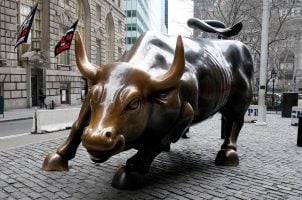Sports Betting Can Weather Pullback in Consumer Spending
Posted on: December 22, 2023, 05:00h.
Last updated on: December 22, 2023, 11:01h.
Wagering-related expenditures, whether allocated to slot machines, table games, or sports wagering, epitomize consumer discretionary spending.

That implies that if consumer spending retreats in a material fashion, there’s potential vulnerability for gaming companies. Prior recessions confirm as much, though broadly speaking, the industry proved sturdy during periods of deep economic contraction. So perhaps it’s not surprising that some experts believe sports betting could be resilient even if consumers pare other forms of entertainment spending.
Online sports bets (18%) and in-game purchases (19%) spending are roughly the same, and have been impacted less by the changing economic climate,” according to a recent Paysafe survey. “Along with streaming services, these at-home entertainments may flourish, should budgets continue to tighten.”
The study indicates that since the onset of the coronavirus pandemic in early 2020, and a subsequent spike in inflation in 2021 and 2022, how consumers allocate dollars to nonessential goods and services has shifted. But those alterations haven’t pinched casino gaming and sports betting.
Sports Betting Qualifies as an Experience
While naysayers may be apt to debate the point, sports wagering is experiential, and that’s meaningful at a time when consumer spending is shifting from goods to experiences.
That also augurs well for land-based casino operators, particularly those on the Las Vegas Strip, where gaming venues typically offer much more than casinos, leveraging high-end entertainment and food and beverage offerings to smooth out the volatility associated with gaming revenue.
“Many consumers are spending less of their disposable income on the physical goods they enjoy. 32% are spending less on clothes, and 31% are doing the same for household appliances and other gadgets,” added Paysafe.
The firm’s “Lost In Transaction” report found “51% of respondents prioritizing experiences over other discretionary spending.”
Las Vegas Strip operators can continue posting solid revenue growth and prove resilient even if gaming revenue experiences a modest decline. That resilience also dispels the notion that Las Vegas casino companies generate the bulk of their sales from gaming. In reality, food and beverage, and entertainment stoke more revenue than gaming.
Sports Betting Proving its Metal in Tricky Climates
Relative to other consumer discretionary industries, sports wagering is young on the national stage. The Supreme Court ruling on the Professional and Amateur Sports Protection Act (PASPA) was delivered in 2018. But regulated sports betting came of age during the darkest days of COVID-19 in 2020, when many Americans were confined to their residences and lost access to other discretionary outlets, such as amusement parks, museums, and theaters.
Recently, bettors proved devoted to sports wagering amid soaring inflation and the highest interest rates in two decades. Data indicate next year could be another positive one for the sports betting space.
“Almost half (49%) of consumers are confident the financial situation will improve next year, and 50% say they’ll spend their money differently in 2024 than they did in 2023,” concluded Paysafe.
Related News Articles
FanDuel, Fanatics Could be Among 2023’s Hottest IPOs
Will DraftKings, FanDuel Have Fanatics Problem? Possibly
Super Group SPAC Facing Shareholder Lawsuit
EDGE Markets Close to Offering Sports Betting Loan Product
Most Popular
LOST VEGAS: ‘Tony The Ant’ Spilotro’s Circus Circus Gift Shop
Casinos That Were Never Casinos
Most Commented
-
End of the Line for Las Vegas Monorail
— April 5, 2024 — 90 Comments -
Cracks Emerging on Las Vegas Strip Says Analyst
— April 30, 2024 — 14 Comments -
Mega Millions Reportedly Mulling Substantial Ticket Price Increase
— April 16, 2024 — 9 Comments
















No comments yet